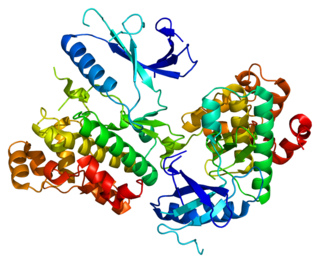The transforming growth factor beta (TGFB) signaling pathway is involved in many cellular processes in both the adult organism and the developing embryo including cell growth, cell differentiation, apoptosis, cellular homeostasis and other cellular functions. In spite of the wide range of cellular processes that the TGFβ signaling pathway regulates, the process is relatively simple. TGFβ superfamily ligands bind to a type II receptor, which recruits and phosphorylates a type I receptor. The type I receptor then phosphorylates receptor-regulated SMADs (R-SMADs) which can now bind the coSMAD SMAD4. R-SMAD/coSMAD complexes accumulate in the nucleus where they act as transcription factors and participate in the regulation of target gene expression.

Bone morphogenetic protein receptor type II or BMPR2 is a serine/threonine receptor kinase. It binds Bone morphogenetic proteins, members of the TGF beta superfamily of ligands, which are involved in paracrine signalling. BMPs are involved in a host of cellular functions including osteogenesis, cell growth and cell differentiation. Signaling in the BMP pathway begins with the binding of a BMP to the type II receptor. This causes the recruitment of a BMP type I receptor, which it phosphorylates. The Type I receptor phosphorylates an R-SMAD a transcriptional regulator.

Endoglin (ENG) is a type I membrane glycoprotein located on cell surfaces and is part of the TGF beta receptor complex. It is also commonly referred to as CD105, END, FLJ41744, HHT1, ORW and ORW1. It has a crucial role in angiogenesis, therefore, making it an important protein for tumor growth, survival and metastasis of cancer cells to other locations in the body.

Transforming growth factor beta receptor I is a membrane-bound receptor protein for the TGF beta superfamily of signaling ligands. TGFBR1 is its human gene.

Transforming growth factor, beta receptor II (70/80kDa) is a TGF beta receptor. TGFBR2 is its human gene.

Glycogen synthase kinase 3 beta, also known as GSK3B, is an enzyme that in humans is encoded by the GSK3B gene. In mice, the enzyme is encoded by the GSK-3β gene. Abnormal regulation and expression of GSK3β is associated with an increased susceptibility towards bipolar disorder.

AKT2, also known as RAC-beta serine/threonine-protein kinase, is an enzyme that in humans is encoded by the AKT2 gene. It influences metabolite storage as part of the insulin signal transduction pathway.

WNK , also known as WNK1, is an enzyme that is encoded by the WNK1 gene. WNK1 is serine-threonine kinase and part of the "with no lysine/K" kinase WNK family. The predominant role of WNK1 is the regulation of cation-Cl− cotransporters (CCCs) such as the sodium chloride cotransporter (NCC), basolateral Na-K-Cl symporter (NKCC1), and potassium chloride cotransporter (KCC1) located within the kidney. CCCs mediate ion homeostasis and modulate blood pressure by transporting ions in and out of the cell. WNK1 mutations as a result have been implicated in blood pressure disorders/diseases; a prime example being familial hyperkalemic hypertension (FHHt).

Serine/threonine-protein kinase Sgk3 is an enzyme that in humans is encoded by the SGK3 gene.

Serine/threonine-protein kinase D3 (PKD3) or PKC-nu is an enzyme that in humans is encoded by the PRKD3 gene.

Serine-threonine kinase receptor-associated protein is an enzyme that in humans is encoded by the STRAP gene.

Serine/threonine-protein kinase Nek6 is an enzyme that in humans is encoded by the NEK6 gene.

Mitogen-activated protein kinase 6 is an enzyme that in humans is encoded by the MAPK6 gene.

Calcium/calmodulin-dependent protein kinase kinase 1 is an enzyme that in humans is encoded by the CAMKK1 gene.

Calcium/calmodulin-dependent protein kinase kinase 2 is an enzyme that in humans is encoded by the CAMKK2 gene.

Serine/threonine-protein kinase 38-like is an enzyme that in humans is encoded by the STK38L gene.

Serine/threonine-protein kinase Sgk2 is an enzyme that in humans is encoded by the SGK2 gene.

Inhibin beta C chain is a protein that in humans is encoded by the INHBC gene.

Serine/threonine-protein kinase WNK3, also known as protein kinase lysine-deficient 3, is a protein that in humans is encoded by the WNK3 gene.

Serine/threonine-protein kinase Sgk1 also known as serum and glucocorticoid-regulated kinase 1 is an enzyme that in humans is encoded by the SGK1 gene.














